QuestionQUESTION: I have a pair with 3 babies. I noticed the youngest has had feather loss on its lower back and under the wings, and there are feathers from this baby in the nest box. I've also noticed the baby protesting when the hen tries to preen it.
The two older babies have already left the nest box, and the youngest should be leaving soon.
I would have left the baby until I could remove the box, but the pair has already laid two more eggs. The first two babies have been in and out of the box, and I expect the third to do this also, until they're weaned and I can put them into another cage.
What do you suggest I do?
ANSWER: Hi, Andrew.
I'm not sure what your question(s)/concern(s) are. How old are these babies? Are the babies eating any food on their own yet? Do you want more babies? Are these parakeets or another species of parrot?
The hen might be plucking the youngest baby because she wants it out of the box since she's laying eggs again. If the babies aren't eating on their own yet, you can't separate them from the parents unless you know how to handfeed them (using handfeeding syringe and baby parrot handfeeding formula) and/or how to wean them yourself. Daddy will try to wean these babies quickly since a new brood will be arriving soon. Obviously, the hen is hurting the baby if the baby "protests" when she preens it. Your options are limited here unless the babies are eating food on their own.
Please provide answers to my questions and/or provide as much detail as possible and I may be able to advise further.
Chrys
---------- FOLLOW-UP ----------
QUESTION: The babies are 4-5 weeks old. They aren't eating any food on their own yet, since they have only left the nest box to begin flight.
I was not planning on more babies until I could give away or sell the ones that have hatched, but the pair laid eggs before I could remove the nest box. If all had gone how planned, I would have let the pair rest for 4 or 5 months, and then allowed another clutch.
These are cockatiels, sorry for not making that clear before.
This is my first time breeding, and I was not planning on hand feeding until I had been through a couple of clutches. I do have the knowledge to do it, and plenty of resources too. If need be, I will hand feed.
I was reading some of your other answers to questions, and someone said that the parent seemed to stop plucking when the baby was old enough to get away from it. If this is the case, then I want to leave the baby with the parents.
AnswerHi again, Andrew.
Baby tiels that are parent-raised usually don't wean completely until they are about 8 wks old, often later depending on the individual birds involved. However, since your pair is on another clutch of eggs, they will try to wean these babies quickly since they can't feed 2 clutches of babies at the same time. I think your best bet would be to separate these babies from their parents and handfeed them and wean them yourself. At 4-5 weeks of age, you can start weaning these babies to other foods, but you'd still need to handfeed 3-4 times per day until they are completely weaned. You don't mention how tame these babies are or aren't...usually parent-raised babies aren't tame enough to handle so handfeeding them yourself will make them tame/tamer so you can give them away/sell them easier (most potential parrot owners want tame birds they can handle). Visit my website for more information on handfeeding, weaning, etc.: www.angelfire.com/falcon/birdinfo/index.html
I suspect the parent is plucking the youngest because it wants the baby out of the nesting box. You might want to try putting the baby in the cage with daddy and siblings to get this baby used to being outside the nesting box and used to being on its own. Adult pairs will usually go to nest again when most babies in a clutch have left the nesting box. When a person doesn't want any more baby birds, I always recommend removing any babies for handfeeding when the babies are young and then taking the nesting box down before the hen goes to nest again. Handfeeding is always good when one wants tame and handleable babies to sell or give away. For a person to try and tame a parent-raised baby bird AFTER the baby is weaned is usually very difficult, as taming begins when a baby is quite young (7-14 days old, depending on the species) via the baby being handfed so it imprints on humans versus its parents.
If you don't want another clutch of babies right now, you have a couple of choices. 1 - You can allow the female to finish laying a clutch (which is usually 4-6 eggs), then immediately remove the eggs when the last egg is laid, boil them for a few minutes, let them cool and place the hardboiled eggs under the female. The pair will incubate them for a bit then eventually abandon them when they realize the eggs aren't going to hatch. 2 - You can remove the laid eggs and replace them with dummy eggs (which you can purchase at some pet stores or via the internet). OR you can allow them to incubate and hatch the second clutch, remove the babies competely from the parents when they are around 2 wks old for handfeeding, and take the nesting box down. You should limit the number of clutches your birds have to 2 per year, depending on how many babies are produced per clutch and the health of the parents and the babies. Sickly babies are usually produced from unhealthy parents. Overbreeding can produce sickly babies.
If the younger baby is only getting picked on when it is in the nesting box, then it's safe to say the parent bird wants it out. Once it leaves the box for good, it most likely won't get picked on any more. It's important that this baby not get picked on. If the parent is picking on this baby outside the nesting box as well as inside the box, you really need to remove it for handfeeding. Picking can lead to too much stress which can result in illness, a baby just getting too run down to be able to start off well in life, therefore, do what has to be done to eliminate the picking. Feather damage can occur, too, depending on the severity of the plucking, not to mention sore areas/bleeding, possible infection.
Chrys

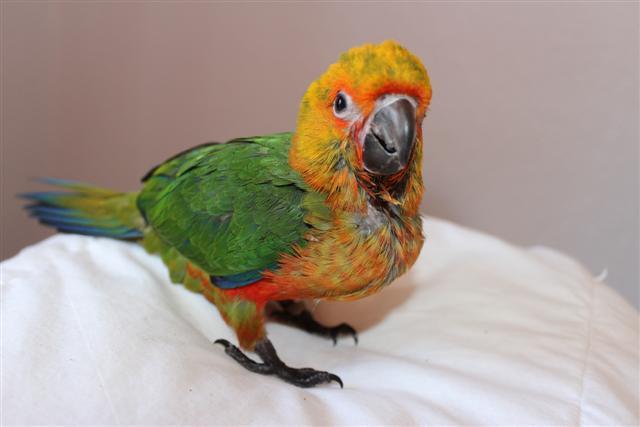 Jenday Conure Weaning?
Question
Castor the Conure
Hi
I have a 9 week o
Jenday Conure Weaning?
Question
Castor the Conure
Hi
I have a 9 week o
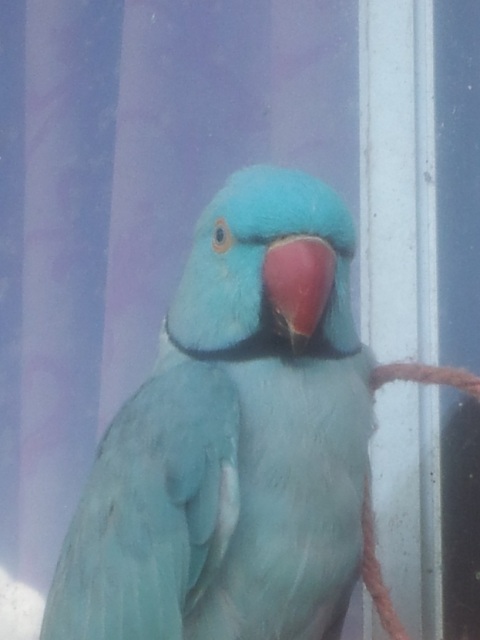 RE: Indian Ringneck probems
Question
Indy our Ringneck
Thank you for your he
RE: Indian Ringneck probems
Question
Indy our Ringneck
Thank you for your he
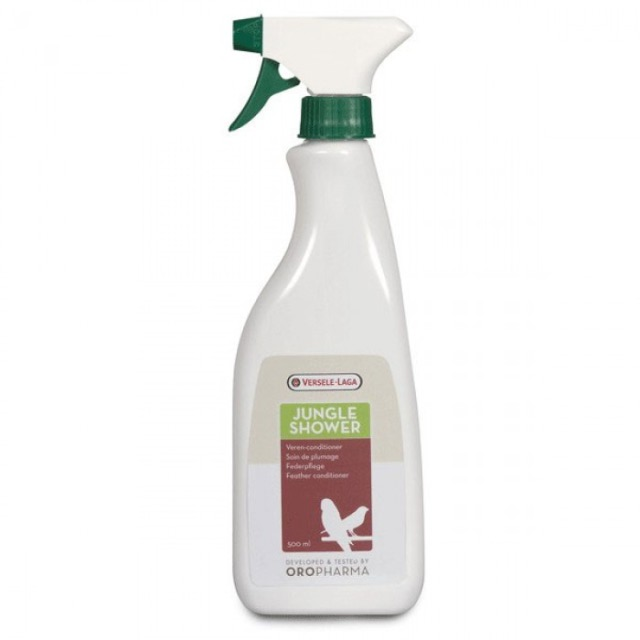 Indian Ringneck Health Issue
QuestionI have an Indian Ringneck who had been neglecte
Indian Ringneck Health Issue
QuestionI have an Indian Ringneck who had been neglecte
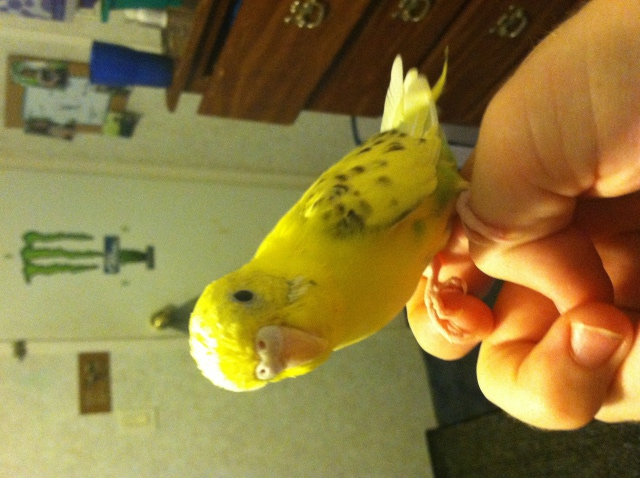 Parakeet gender
Question
Parakeet
Hi, I looked for an expert und
Parakeet gender
Question
Parakeet
Hi, I looked for an expert und
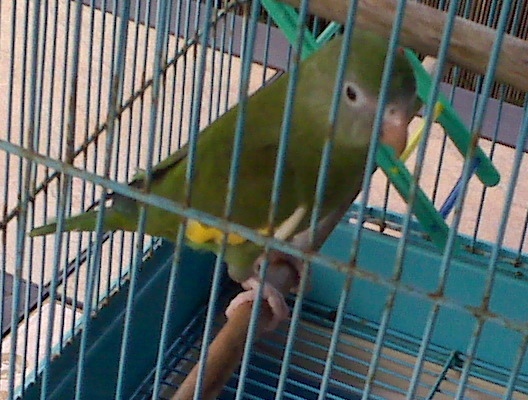 What type of parrot is this?
Question
Friendly bird
A week ago ths small parrot flew
What type of parrot is this?
Question
Friendly bird
A week ago ths small parrot flew